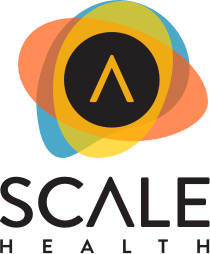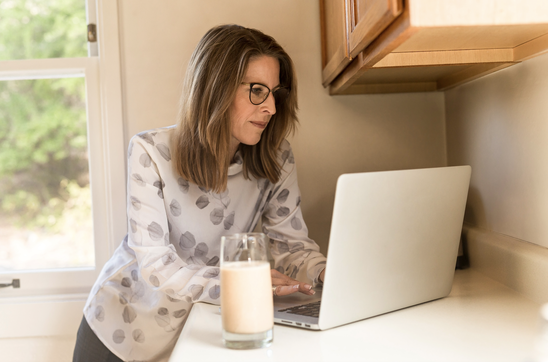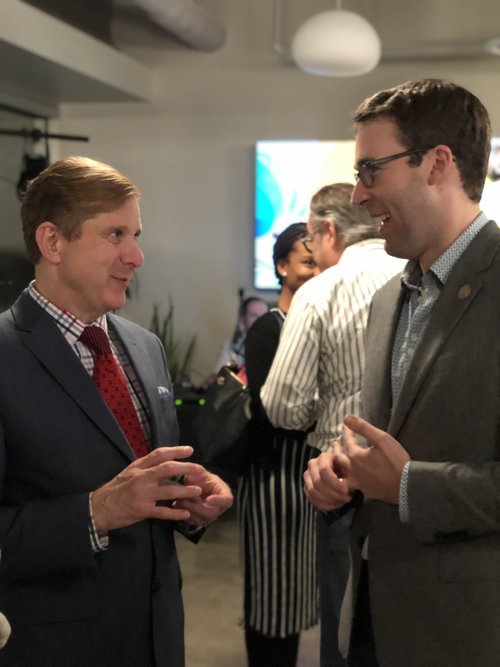Regardless of our backgrounds, careers, or lifestyle choices, all women who reach middle age have one very important thing in common: menopause. Yet outside of the occasional joke about hot flashes, this commonality isn’t widely discussed. Worse yet, the health care and support available to women during menopause is often shrouded in confusion and limited in scope.
Menopause, which marks the end of a woman’s menstrual cycle, is a natural process that typically occurs between the ages of 45 and 55. As the production of reproductive hormones like estrogen and progesterone decreases, women experience a range of symptoms from dizziness and irregular sleep patterns to weight gain, night sweats, mood changes and joint pain. Not only do these symptoms have a significant impact on daily life; the hormonal changes during menopause can lead to more severe health issues like incontinence, loss of libido, osteoporosis, and increased risk of heart disease.
This major life transition is experienced by millions of women each year (the 2010 U.S. census estimates a population of 50 million midlife women by 2020). And yet, despite the inevitability and breadth of menopause, women still encounter a lack of clarity, credibility and personalization when searching for care.
Even OB/GYNs lack specialization to treat menopausal patients. According to a recent study published in the New England Journal of Medicine, fewer than one in five U.S. obstetrics and gynecology residents receive formal training in menopause medicine. Not to mention that disparities in funding and scientific research surrounding women’s health have kept menopausal care options limited for decades.
Until recently, women have largely had only two choices: hormone therapy or herbal remedies. According to the FDA, however, hormonal medications can bring serious side-effects including increased risk of blood clots, heart attacks, strokes and breast cancer. And herbal therapies often lack standardization and regulation.
![]()
At Jessie, we’re working to address gender gaps in healthcare by leveraging technology to make it easier for women to find, access, and receive the care they need, when they need it. As the population of women above 50 continues to grow, we see a serious need for innovation in menopausal treatment and support.
Luckily, we’ve seen an emergence in reputable, women-led companies developing new solutions to meet the unique needs of women experiencing menopause.
Developed at Stanford by Holly Rockweiler, Madorra is a handheld ultrasound device that helps relieve post-menopausal vaginal dryness, a symptom experienced by 32 million U.S. women. Typically, this symptom has been treated with hormone therapies, an option that is not always safe for women depending on their age or risk of cancers. Rockweiler developed Madorra to be an approachable alternative — a daily-use device that delivers ultrasound waves to relieve symptoms. A typical application only takes about five minutes. The Portland-based startup is already on track to grow with $500,000 in backing from PitchFest and Angel Oregon.
Another femtech company on our radar is San Francisco startup Menopause.ai, the first artificial intelligence platform that creates personalized solutions for menopausal women. Founded by neuroscientist Sohila Zadran, the platform is trained to learn about each user’s unique menopause experience, using the data it gathers to offer custom, research-backed solutions including nutriceuticals, skin care & feminine products.
And we’re proud to partner with genneve, a game-changing company championing the unique care needs of midlife women. Founded by former Microsoft exec Jill Angelo, genneve is the first-of-its-kind online clinic for women in menopause. After completing a free self-assessment, women are guided to the care and support they need, whether it’s an affordable $45 telehealth appointment with a menopause specialist, online videos and webinars, menopause-specific feminine care products, or advice from a trusted community of women experiencing similar symptoms.
Genneve shares a similar vision to ours at Jessie, using technology to improve women’s access to high-quality health care information, resources, providers, and treatments.
We’re excited to see these femtech innovators begin to address the traditionally underserved needs of women experiencing menopause. Midlife women make up nearly 20% of the U.S. workforce and have an average life expectancy of 85 — needless to say, the menopausal care they receive has a significant impact on their productivity, quality of life, and overall wellness now and for years to come.
![]()
While the three companies above are working hard to support women during menopause, we still see a lot of potential for additional innovation. There are 34 common symptoms of menopause, and each woman experiences this transition differently — imagine the possibilities to better serve this market! As the femtech sector expands, we hope that a new wave of products, resources, and care options become readily available to meet the varying needs of midlife women.
About the authors:
Amy Domangue and Kerranna Williamson are the Co-Founders of Jessie, a Techstars and Cedars-Sinai-backed digital women’s health company. The two are experts in healthcare marketing and innovation, having worked in commercialization, cancer advocacy, and genetic testing for over 10 years. After connecting at a shared workspace in Charleston, SC, the duo merged their expertise and networks to launch a women’s health genetic marketplace in 2016. In 2018, Amy and Kerranna relocated to Los Angeles to expand the business to include a full range of digital health services for women. Today, Jessie has grown into one of the largest networks of online women’s health services, improving the way women access, experience, and manage their care.
As Jessie continues our mission to improve the way women find, access and receive care, we look forward to collaborating with femtech innovators serving the needs of women in menopause. You can sign up for our beta (and learn more about our great partners like genneve) at: https://www.hellojessie.com/.





